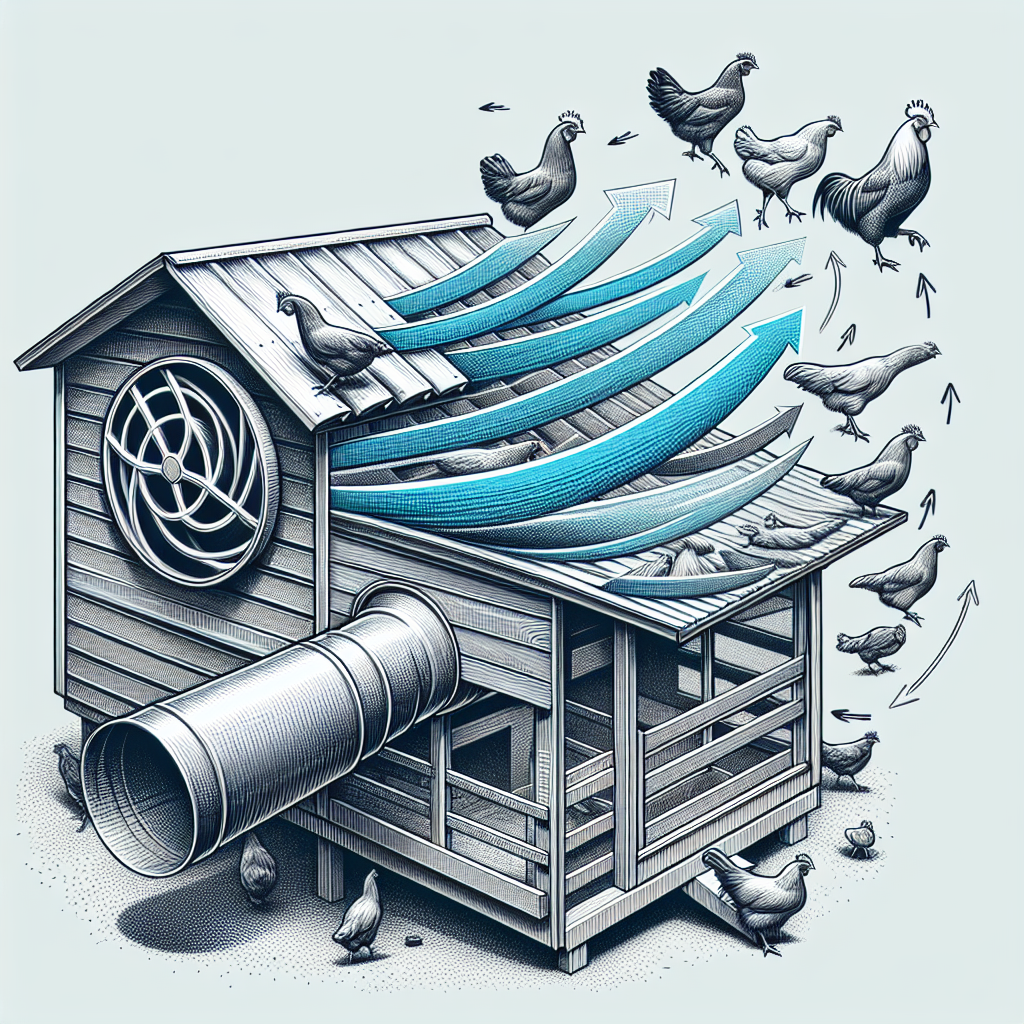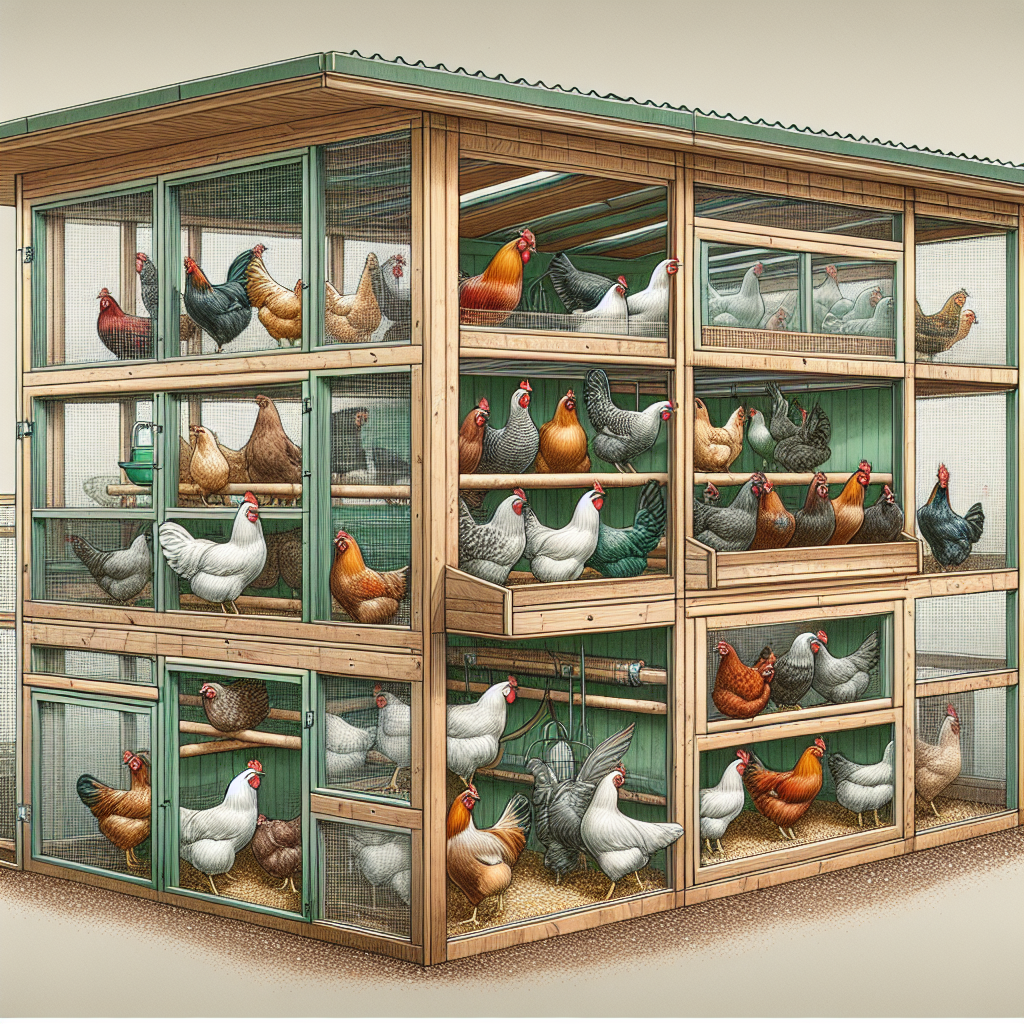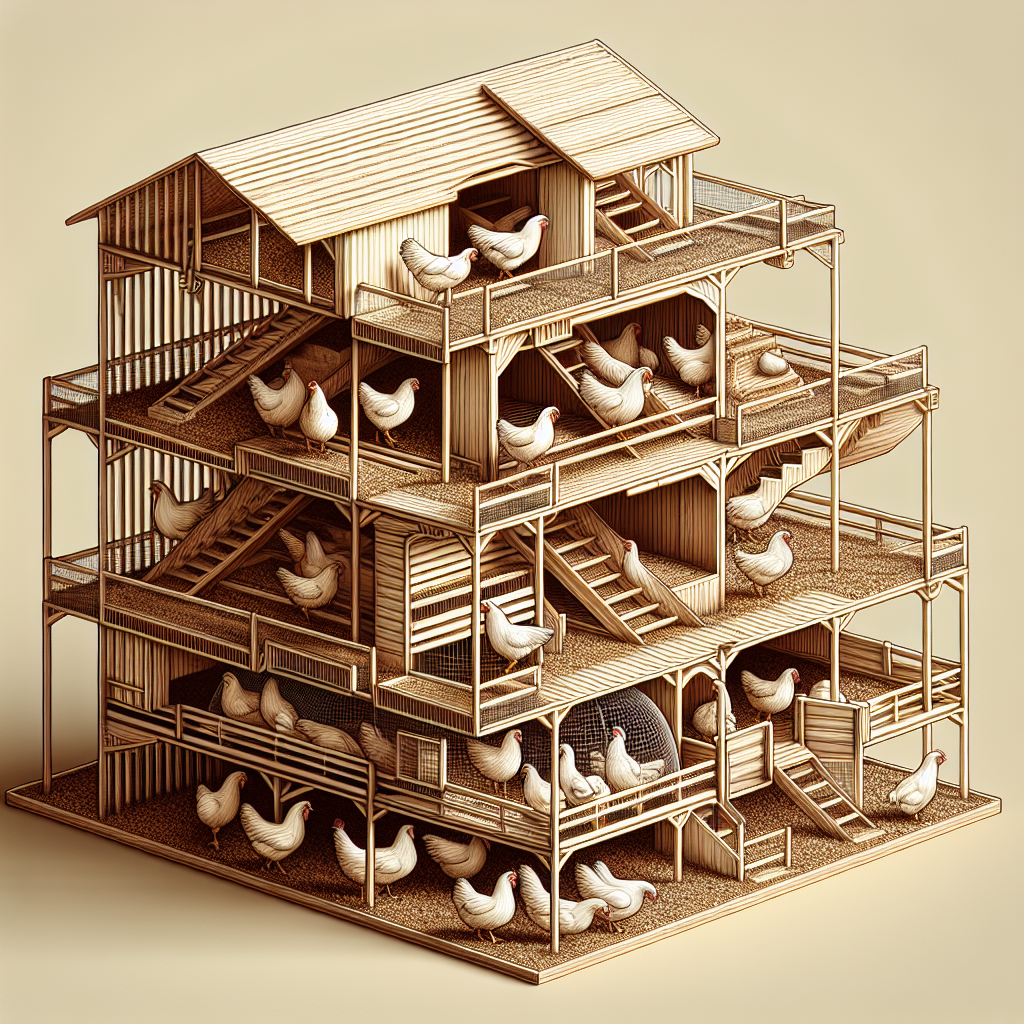Imagine a world where your chickens are not only happy and comfortable, but also healthy. It turns out that ensuring proper ventilation and insulation in coop designs can have a significant impact on the well-being of your flock. By maintaining a well-ventilated coop, you can reduce the risk of respiratory illness and minimize the buildup of harmful gases. Additionally, proper insulation helps to keep your chickens warm in the winter and cool in the summer, promoting their overall health and productivity. In this article, we will explore the numerous health benefits that come with prioritizing proper ventilation and insulation in coop designs. So let’s dive in and discover how you can create the perfect environment for your feathered friends.
Improved Air Quality
Proper ventilation and insulation in coop designs offer several health benefits, starting with improved air quality. Effective ventilation systems help to reduce humidity levels within the coop, creating an environment that is less favorable for the growth of bacteria, fungi, and other microorganisms. By lowering humidity, you can minimize the risk of respiratory diseases in your flock and promote healthier air for both you and your birds to breathe.
Furthermore, proper ventilation helps to remove toxins and odors that can accumulate in the coop. Ammonia, for example, is a common byproduct of bird waste and can quickly build up in poorly ventilated spaces. High ammonia levels can irritate the respiratory system of both birds and humans, causing respiratory issues and other health problems. With proper ventilation, you can significantly decrease ammonia levels, creating a more pleasant and healthier environment for everyone involved.
Temperature Regulation
A crucial aspect of coop design is maintaining optimal temperature levels throughout the year. Proper insulation plays an instrumental role in helping to achieve this goal. Insulated coops provide a barrier against external temperatures, preventing extreme heat or cold from affecting the birds.
In warmer climates, insulation helps to prevent heat stress in your flock. By reducing the transfer of heat from the outside to the coop, insulation keeps the interior cooler and more comfortable. Heat stress can be particularly detrimental to birds, leading to reduced egg production and growth rates, as well as increased mortality rates. By investing in proper insulation, you can safeguard your animals against these risks and ensure their continued wellbeing.
Similarly, insulation also protects against the harsh cold temperatures during winter. By providing a layer of insulation, you can prevent frostbite and hypothermia, which can be life-threatening for your birds. Insulation traps heat in the coop, keeping them warm and comfortable, even in frigid conditions. This not only promotes their overall welfare but also improves productivity, as birds that are not expending excessive energy to stay warm can focus on other essential functions.
Reduced Moisture and Condensation
Excess moisture and condensation within the coop can create various problems, ranging from the growth of mold and mildew to structural damage. Proper ventilation and insulation help to reduce and eliminate these issues, ensuring a healthier and safer environment for your birds.
By preventing moisture buildup through adequate ventilation, you can reduce the risk of mold and mildew growth in the coop. These fungi thrive in damp and poorly ventilated spaces and can lead to respiratory issues and other health problems for both birds and humans. Additionally, mold can damage coop materials and compromise the structural integrity of the building. Proper ventilation helps to remove excess moisture, effectively minimizing the growth of mold and mildew and protecting both your birds and the coop itself.
Furthermore, a well-insulated coop reduces the occurrence of condensation. Condensation forms when warm, humid air comes into contact with cold surfaces, such as the coop walls. This can result in wet surfaces and promote the growth of mold, mildew, and other microorganisms. Proper insulation helps to maintain a consistent temperature within the coop, minimizing the likelihood of condensation and preventing potential structural damage.
Improved Indoor Comfort
Ventilation and insulation contribute to enhanced indoor comfort for both you and your birds. With optimal thermal comfort, the coop becomes a pleasant environment that promotes the overall wellbeing of your flock.
One of the key benefits of proper insulation is the reduction of drafts and temperature fluctuations within the coop. Inadequate insulation can result in cold drafts entering the coop during winter or warm drafts during summer, causing discomfort and stress for the birds. By ensuring sufficient insulation, you can effectively regulate temperature levels within the coop, offering a consistent and comfortable environment for your feathered friends.
Moreover, insulation helps to maintain more stable temperature conditions, reducing sudden temperature swings. This stability can help minimize stress in your birds, which can negatively impact their health and productivity. By creating a pleasant environment with consistent temperatures, you provide a space where your birds can thrive and achieve their full potential.
Healthier Bird Environment
Proper ventilation and insulation strategies directly contribute to creating a healthier environment for your birds. With a healthier living space, you can help prevent respiratory infections, reduce stress-related behaviors, and improve the overall condition of their feathers.
Ensuring adequate ventilation in the coop significantly reduces the risk of respiratory infections among your birds. Good ventilation promotes fresh air exchange, dilutes and removes airborne pathogens, and enables proper oxygenation. By reducing the concentration of harmful microorganisms in the air, you lower the chances of your flock contracting respiratory diseases, such as infectious bronchitis or avian influenza.
Additionally, a well-ventilated and insulated coop helps to minimize stress-related behaviors in your birds. Overcrowding, excessive heat or cold, and poor air quality can all contribute to stress in birds. By implementing proper ventilation and insulation measures, you provide a comfortable and stress-free environment for your flock, which can lead to improved overall health and behavior.
Feather condition is another critical aspect influenced by proper ventilation and insulation. Birds with access to fresh, clean air and optimal temperature conditions are less likely to experience feather damage, such as feather picking or pecking. Healthy, well-maintained feathers are crucial for insulation, protection, and the overall health of your birds. Through improved ventilation and insulation, you can help maintain excellent feather condition and contribute to the overall wellbeing of your flock.
Increased Productivity and Performance
Proper ventilation and insulation in coop designs have a direct impact on the productivity and performance of your birds. With optimized conditions, you can expect improvements in egg production, growth rates, and feed conversion efficiency.
Maintaining optimal temperature levels through insulation is vital for maximizing egg production in your flock. Extreme temperatures can disrupt the reproductive cycle of birds, leading to reduced egg-laying rates. By providing a consistently comfortable environment, insulated coops help to ensure that your birds can lay eggs at their full potential, contributing to increased productivity.
Furthermore, insulation also plays a role in enhancing growth rates in young birds. Chicks and young poultry require stable and appropriate temperature conditions for optimal growth and development. A well-insulated coop creates an environment that supports healthy growth, allowing your birds to reach their intended size more efficiently.
Additionally, proper ventilation and insulation contribute to improved feed conversion efficiency. By maintaining comfortable conditions, birds are less likely to experience stress or discomfort that can lead to decreased feed intake or inefficient utilization of feed. As a result, your birds can experience better nutrient absorption and utilize their feed more efficiently, leading to improved feed conversion rates.
Prevention of Disease Outbreaks
Proper ventilation and insulation in coop designs play a crucial role in preventing the outbreak and spread of diseases among your flock. Effective measures can help reduce pathogen transmission, prevent vector-borne diseases, and enhance overall biosecurity.
By ensuring proper ventilation, you can minimize the concentration of pathogens in the coop. Good ventilation promotes air exchange, reducing the viability and spread of airborne pathogens. By diluting and removing these pathogens, the risk of diseases such as Newcastle disease or coccidiosis can be significantly reduced.
Moreover, proper insulation can assist in preventing the entry of vectors that can transmit diseases to your flock. Insects, rodents, and other animals can carry and spread various diseases among poultry. Insulated coops with sealed entrances and proper insulation barriers help to exclude these vectors, reducing the risk of diseases caused by external sources.
In addition to preventing pathogen transmission, proper ventilation and insulation also support improved biosecurity measures. Adequate ventilation can help create and maintain a clean environment by removing dust, contaminants, and pathogens. When combined with insulation, biosecurity measures can be enhanced, reducing the risk of introduction and spread of diseases within your flock.
Energy Efficiency
Proper ventilation and insulation in coop designs contribute to improved energy efficiency, benefiting both your budget and the environment. By reducing heating and cooling costs, increasing energy savings, and adopting environmentally friendly practices, you can achieve a more sustainable and cost-effective operation.
Insulated coops help to retain heat during winter and prevent excessive heat buildup during summer. By reducing the transfer of heat between the coop and the environment, insulation minimizes the need for additional heating or cooling. This translates to significant energy savings, as less energy is required to maintain comfortable temperatures within the coop, leading to reduced heating and cooling costs.
Furthermore, improved energy efficiency also means a reduced environmental impact. By minimizing the energy consumption of your coop, you contribute to a more sustainable approach to poultry farming. Lower energy consumption translates to reduced greenhouse gas emissions, helping to mitigate the carbon footprint of your operation. By adopting energy-efficient coop designs, you actively participate in environmental preservation, creating a more sustainable future.
Minimized Ammonia Levels
One of the critical aspects of proper ventilation is controlling ammonia levels within the coop. Ammonia, a byproduct of bird waste, can accumulate in poorly ventilated spaces and pose significant health risks to both birds and humans. Implementing proper ventilation strategies helps to control and minimize ammonia levels, ensuring improved respiratory health and reduced chemical exposure.
Ammonia control is fundamental for maintaining optimal respiratory health in your flock. High levels of ammonia can irritate the respiratory system of birds, leading to various health issues such as respiratory infections or impaired lung function. By providing adequate ventilation, you can ensure the continuous removal of ammonia and maintain healthier air quality within the coop.
In addition to benefiting the birds, minimizing ammonia levels also protects human health. Prolonged exposure to high levels of ammonia can cause eye irritation, respiratory issues, and other health problems for those working in the coop. Proper ventilation helps to remove and dilute ammonia, reducing the risk of chemical exposure for you and other individuals involved in the care of your flock.
Preservation of Building Materials
Proper ventilation and insulation also contribute to the preservation of building materials used in coops. By preventing condensation damage, extending the lifespan of construction materials, and reducing maintenance and repair costs, you can ensure the long-term durability and functionality of your coop.
Inadequate ventilation can lead to condensation forming on coop surfaces, such as walls or ceilings. Over time, this condensation can cause water damage to the building materials, resulting in rot, mold growth, and compromised structural integrity. Proper ventilation helps to minimize condensation by allowing moisture to escape, preventing potential damage and preserving the longevity of your coop.
Furthermore, ensuring proper ventilation and insulation can extend the lifespan of construction materials used in your coop. Continuous exposure to extreme temperatures, moisture, and other environmental factors can accelerate wear and tear on the structure. However, by providing insulation and maintaining comfortable conditions, you reduce the strain on the building materials, effectively prolonging their useful life.
By preserving the integrity of your coop, you can also minimize maintenance and repair costs in the long run. Coops that are well-ventilated and insulated are less likely to require significant repairs or constant maintenance. By investing in proper ventilation and insulation upfront, you can save on costly repairs and upkeep expenses, allocating those resources to better support the health and wellbeing of your flock.
In conclusion, proper ventilation and insulation in coop designs offer numerous health benefits for both your birds and yourself. Improved air quality, temperature regulation, reduced moisture and condensation, enhanced indoor comfort, healthier bird environment, increased productivity and performance, prevention of disease outbreaks, energy efficiency, minimized ammonia levels, and preservation of building materials are all key advantages of implementing effective coop ventilation and insulation strategies. By prioritizing these aspects in your coop design and maintenance, you create a healthier, more productive, and sustainable environment for your flock, contributing to their overall welfare and your own satisfaction as a poultry keeper.




